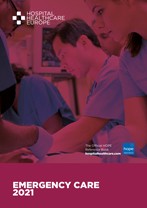Among trauma patients in the emergency department (ED), the quick sequential Organ Failure Assessment score (qSOFA) has shown good predictive value for mortality.
Road traffic accidents are often fatal with data from 2015 compiled by the World Health Organization showing that every year the global number of fatal road traffic accidents is around 1.25 million.1 While several tools such as the Revised Trauma Score2 (RTS) and the Trauma and Injury Severity Score3 have been developed to rate both the severity of a trauma and as a prognostic guide, these scores require calculation via formulas that are too complicated for use in the emergency department (ED) resuscitation room. One potential tool is the qSOFA and this has been used to predict mortality risk in patients both with4 and without infection.5
How well the score might perform in predicting mortality in ED resuscitation rooms is yet to be determined and was the subject of a retrospective study by a team from the Department of Critical Care Medicine, the First Affiliated Hospital of Soochow University, Jiangsu Province, China.6 The qSOFA score ranges from 0 to 3 and has three components: a systolic blood pressure (SBP) of 100mmHg or less, a respiratory rate (RR) of 22/min or greater and altered mentation. Over a three-year period, the team divided patients into two groups: survivors and non-survivors and then four subgroups according to their score. They also used the Glasgow Coma Score (GCS) and used this to calculate the RTS score, which is the sum of the GCS, SBP and RR. The main study endpoint was mortality in the ED resuscitation room and multivariate regression was used to determine the association between qSOFA scores and mortality. In addition, receiver operating characteristic (ROC) curve analysis was used to assess the mortality predictive ability of qSOFA scores.
Findings
A total of 1739 patients were included in the analysis, 1695 survivors with a mean age of 51 years (73% male) and 44 non-survivors (mean age 50 years, 77.3% male). In terms of the qSOFA scores, 57.8% had a score of 0, 33.3% scored 1, 8.1% scored 2 and 0.75% scored 3. In addition, the proportion of patients dying increased significantly with qSOFA scores, e.g., 0.60%, 3.38%, 12.06% and 15.38% for qSOFA scores of 0, 1, 2 and 3, respectively (p < 0.001). There was also a significant difference in the mean time spent in the ED (4 vs 13 hrs, survivors vs non-survivors, p < 0.001).
Mortality was significantly associated with qSOFA scores with scores of at least two were associated with a significant increased risk of death. For example, using a qSOFA score as the reference point, a qSOFA score of 2 was associated with a nearly seven-fold increased risk of death (odds ratio, OR = 6.80, 95% CI 1.79–25.90, p = 0.005) and a qSOFA score of 3 with a 24-fold increased risk (OR = 24.42). Using the area under the receiver operating curve (AUC), qSOFA scores had a predictive value for mortality of 0.78 (95% CI 0.72–0.85).
Concluding, the authors stated that the qSOFA score can be used to assess the severity of ED trauma patients and has a good predictive value for mortality.
References
- World Health Organization. Global status report on road safety 2015. www.afro.who.int/publications/global-status-report-road-safety-2015 (accessed October 2021).
- Champion HR et al. A revision of the Trauma Score. J Trauma 1989;29(5): 623–9.
- Boyd CR et al. Evaluating trauma care: the TRISS method. Trauma Score and the Injury Severity Score. J Trauma 1987;27(4):370–8.
- Seymour CW et al. Assessment of clinical criteria for sepsis. J Am Med Assoc.2016;315(8):762–74.
- Ñamendys-Silva SA et al. Usefulness of qSOFA and ECOG scores for predicting hospital mortality in postsurgical cancer patients without infection. International journal of chronic diseases. Int J Chron Dis 2019 Article ID 9418971.
- Huang W et al. Predictive value of qSOFA score for death in emergency department resuscitation room among adult trauma patients: a retrospective study. BMC Emerg Med 2021, 103 https://doi.org/10.1186/s12873-021-00498-0





